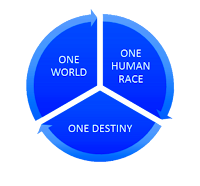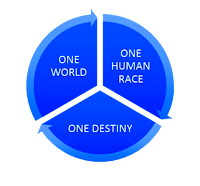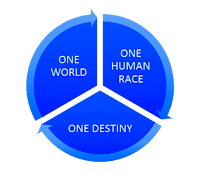AN IMAGINARY CONVERSATION WITH GOD. PART 10.
This is a continuation of Taku2u's imaginary conversation with God. In having this conversation, Taku2u is working on the premis that, like a father or mother to their children, God would not object to his children - based on the proposition of the creationists - having an frank and honest conversation with him/her/deity.
T.: Moving on, G. In verse 22 of Chapter 3 of Genesis, you are quoted as expressing some alarm that “man has become as one of us, to know good and evil”, and might take and eat of the tree of life and live forever. So, why were you so afraid of man, your own creation, who, according to the scribes, you created in your own image, that you turned your back on him and his wife and drove them out of the garden?
G.: You know what, T, can you imagine the fear which humans had when the first atomic bombs were made and exploded, how they would have feared that it could have resulted in the end of the world as it were? Yes, of course you can. Do you also remember the catastrophe which resulted from the Americans dropping the atomic bombs on Hiroshima and Nagasaki; how it would have been perceived by the victims as the end of the world? As probably live the concept of hell which is promulgated?
Well, T, if I were to take credit for what has been said of me in Genesis, pertaining to being fearful of humans becoming like the gods, as you might have put it, I would have said that human’s subsequent abuse of their evolving power, was my concern. As you have said elsewhere, being god, I should and would have known that humans would abuse their power, and having power like the gods, would have meant that the result of their abuse of it could prove even more cataclysmic.
But, of course, as you might say, the cat has already been let out of the bag, the knowledge or good and evil is known to humans, and they have acquired the power to give effect to either or both of them. It cannot be undone; thus the motive for the fear of the gods. If, accordingly to the evolutionists, they existed outside the perceptions of humans.
But, of course, as you might say, the cat has already been let out of the bag, the knowledge or good and evil is known to humans, and they have acquired the power to give effect to either or both of them. It cannot be undone; thus the motive for the fear of the gods. If, accordingly to the evolutionists, they existed outside the perceptions of humans.
T.: Thanks for that, G. I might also add that, when you consider the scientific and technological advances which humans have made, sofar, it could be argued that, not only have humans become as powerful as the purported gods, including yourself, G, but that they are more powerful than them. Humans might not have yet discovered the secret of how to achieve everlasting life, except that which is obtained inter-generationally. I might also add that, neither does the idea of living forever as an individual human being seems a very attractive idea.
However, as far as ‘creating’ life is concerned, and outside of that which is begotten from the physical or artificial impregnation of a woman, you will be aware that humans have been able to clone some animals, including sheep.
However, as far as ‘creating’ life is concerned, and outside of that which is begotten from the physical or artificial impregnation of a woman, you will be aware that humans have been able to clone some animals, including sheep.
G.: Well, yes, I am aware of these developments, as well as the fact that, despite the lack of appeal that everlasting life seems to have for you, T, it is something that millions of people appear to be hoping, looking forward to or aspiring to have. It is the promise which has fortified the resolve of millions of god-worshippers, and even some who do not believe in the gods. It might also be said to be the ‘promise’ which has encouraged or motivated millions of people to not rebel against the harsh conditions to which they are subjected to in their, as it were, earthly lives.
T.: I can see the merit of your argument, G. Us humans have a saying which says, 'a little knowledge can be a dangerous thing', probably because of the fact that, having some knowledge automatically leads the explorative person to seek after more or further knowledge. I believe it was Muhammad who advised the faithful to seek after knowledge, even though it does not appear that he and his followers were too keen on them using that knowledge without it being 'dogmatised', as it were, and interpreted from an Islamic perspective.
So, yes, it is interesting that, in the first instance, it might have been humans lack of knowledge of the physical, scientific and spiritual world, which presented man with the need to 'create' their gods', and that now, man has acquired such knowledge that it has relieved him of the need for gods. Unless he should consider his continuing production of knowledge as his god.
G.: Yes, that is certainly a striking paradox. Almost as if the less enlightened you are and ready you are to accept that there are no grand purpose for your existence, the greater your need for an omnipotent and omniscient god, and vice a versa.
To be continued
T.: I can see the merit of your argument, G. Us humans have a saying which says, 'a little knowledge can be a dangerous thing', probably because of the fact that, having some knowledge automatically leads the explorative person to seek after more or further knowledge. I believe it was Muhammad who advised the faithful to seek after knowledge, even though it does not appear that he and his followers were too keen on them using that knowledge without it being 'dogmatised', as it were, and interpreted from an Islamic perspective.
So, yes, it is interesting that, in the first instance, it might have been humans lack of knowledge of the physical, scientific and spiritual world, which presented man with the need to 'create' their gods', and that now, man has acquired such knowledge that it has relieved him of the need for gods. Unless he should consider his continuing production of knowledge as his god.
G.: Yes, that is certainly a striking paradox. Almost as if the less enlightened you are and ready you are to accept that there are no grand purpose for your existence, the greater your need for an omnipotent and omniscient god, and vice a versa.
To be continued











Comments